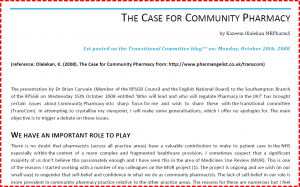by Kazeem Olalekan MRPharmS
When I talk about Pharmacy being the profession of aspiration, some of my colleagues cringe! I understand why they might. It fits into an old narrative that goes something like this: we are pharmacists because we failed in our bid to get into medical school. It is true that some people who studied pharmacy or are studying pharmacy today might have wanted to do different things but the fact is they are pharmacists now and they are getting on with the job in hand. A pharmacist does not see himself or herself as a medical doctor. Their spheres of expertise are different and can be complimentary.Aspiration, as I see it, is not about wanting to be a medical doctor but rather to achieve greater and better things for our profession and our patients. Who was it that said: “Stand still and silently watch the world go by – and it will” ? So as a profession of aspiration, pharmacy aspires to be the de facto authority in medicines optimisation (If you are not sure what this is, I will explore it in more details in subsequent posts).
The main reason for writing this however, is to highlight the analogy I made to the Transition Committee in October 2008 in my “Case for Community Pharmacy” (The document is now available on our new ‘Documents Central page’ – where we will henceforth make documents available for public browsing and downloading). I wrote the following:
The community pharmacist must understand its integral role in delivering quality service for the patient and enhancing the profile of the profession. The community pharmacist is the expert at interpreting complex drug issues and presenting it in a way that will be relevant to and make sense to his patient. This is no mean feat. He must not only be clinically aware but must also have the relevant ’soft skills’ that will enable him to ‘connect’ with the patient. Only an expert can carry this off. The question must therefore be how do we make sure our community pharmacists realise their expertise?
To this end, I will offer this observation: A medical student, Mr ABC went to meds school, worked very hard and passed his exams then graduated. He becomes Dr. ABC. He is very proud of becoming a doctor (with the Dr title in front of his name). He continues to work hard and specialises in surgery and at this point he drops the Dr. title and now want to be called Mr. ABC. He will chastise you if you call him doctor. The message here is that something powerful happens to the mind when it becomes recognised as an expert. It stops trying to prove to people that it is knowledgeable but now focus on applying that knowledge to the benefit of its patients. The challenge to the new professional body is to adopt strategies, which will train and recognise the community pharmacist for their expertise. It is only then that the community pharmacist will become confident.
I then concluded that:
A community pharmacist expert is of great benefit to us all. A professional body, which is widely respected across the wider society, is powerful and various healthcare decision makers will seek its viewpoint. The new Royal Pharmaceutical Society of GB must look after all its gateways to the wider society and community pharmacy is an important component of these.
What was true for the community pharmacy in my contribution 4 years ago, was true for the entire profession. You will understand therefore, that once someone or an entity is recognised as an expert in something, he/she/it/they stops trying to prove to people that it is knowledgeable but now focus on applying that knowledge to the benefit of its patients. As in the example above, the ‘Dr’ title becomes redundant.
We (the pharmacy profession), that is myself included, will continue to strive to be the best we can be. This reminds me of a nursery rhyme, I was teaching my daughter recently:
Good, Better, Best…I will never rest, until my good is better, and my better best!







Leave a Reply